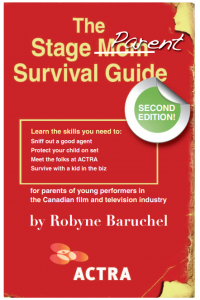Stage Parent Survival Guide
 First published in 2002, The Stage Parent Survival Guide by Robyne Baruchel is an invaluable resource for parents and guardians of school-aged children in the Canadian film and TV industry.
First published in 2002, The Stage Parent Survival Guide by Robyne Baruchel is an invaluable resource for parents and guardians of school-aged children in the Canadian film and TV industry.
The Guide spells out all of the rules negotiated and enforced by ACTRA to protect and support underage performers.
Click on the book for the electronic version or contact ACTRA to arrange receiving your own copy.
Three Simple Rules:
- You are not alone. As a parent of a child working in film, television and commercials, you want to fully understand your child’s rights and working conditions under ACTRA agreements. Remember to ask questions – when it comes to protecting children there are no stupid questions! A legitimate talent agent will help guide most business decisions and, as always, ACTRA is here to help you.
- ACTRA’s collective agreements protect your child. ACTRA agreements set minimum terms and working conditions for ACTRA members, including young performers. ACTRA members are free to negotiate up from these minimums but cannot negotiate below them. Always ask your agent which ACTRA agreement applies to the production and get a copy of that agreement from your ACTRA Branch or online. You’ll have lots of time on set to read the whole agreement but make sure to familiarize yourself with the minor’s section before arriving on set.
While ACTRA representatives do visit sets they also rely on you to inform them if these terms and conditions are being breached. You are the front line of defence to protect your child and ACTRA is only a phone call away.
- Don’t forget to be a parent. Children need to know they are loved and accepted. They must enjoy a certain degree of success in their lives and need encouragement and recognition, beyond their success as a performer.
On set, you are the best judge of your child’s capabilities. Remember, you, or a guardian appointed by you, must always be with children under the age of 16. If a production makes a special request that you are uncomfortable with, or if you believe your child’s health or welfare is being threatened, speak up! When in doubt, contact your child’s agent or ACTRA. If you believe your child may be in physical danger or is being worked overtime, give ACTRA a call immediately!
Frequently Asked Questions
X
On-set tips for parents and child performers
- Performing on a film, television, digital media, or radio program or commercial is work, so please encourage your child to take it seriously.
- Help your child understand the nature of his or her role and follow instructions if needed. Although a child’s moods can be unpredictable, as an attending parent or guardian it’s your responsibility to ensure your child cooperates with any reasonable request. Always keep in mind that your child has been hired to perform as instructed – provided that these instructions don’t violate ACTRA agreements and are not uncomfortable for either you or your child.
- If your child is asked to do something that feels wrong, trust your instincts. You have a right to say ‘no,’ or call ACTRA. If your child has a potential emotional or physical reaction such as fear of heights, which may affect his or her performance, or an allergy, always tell the producers at the time of booking. ACTRA agreements contain clauses that protect minors from performing subject matter of a psychologically damaging nature.
- It’s your right and responsibility to be near where your child is working and to have contact with him or her between takes. Don’t leave, even if production staff say, “Stay clear” on a tight set.
- Make sure your child is well-rested and prepared to do his or her best work. Producers rely on you to honestly tell them how your child is feeling and whether this may jeopardize the next day’s shooting schedule. If your child is old enough to be asked to work overtime (ages 12 to 15) but he or she is overtired – just say no!
- The set is not a social club or child care centre. Siblings, friends and relatives should not be invited to come on set and watch your child perform. Obtain clearances long before the production date if you must bring another individual with you.
- Make sure you know exactly when and where your child should report for work and note this in your diary.
- Make sure you know what you’re expected to provide for your child on the shoot such as clothing, toys, etc.
- There may be a lot of waiting time on set, so you should bring books, quiet games and other material to occupy younger children.
- Although you may be told that the shoot may take less time than the maximum allowed for children under ACTRA agreements, you should be prepared to stay until the approved time limit for your child is reached. Productions frequently take longer than anticipated, so book babysitters and other activities accordingly.
- Ask if transportation is provided. If it is, make sure you know where to get the bus or van and at what time. Leave yourself lots of time to get there and remember to account for travel time when booking babysitters.
BCMPA – Working with Minors – Quick Facts (supplementary document for BC only)

